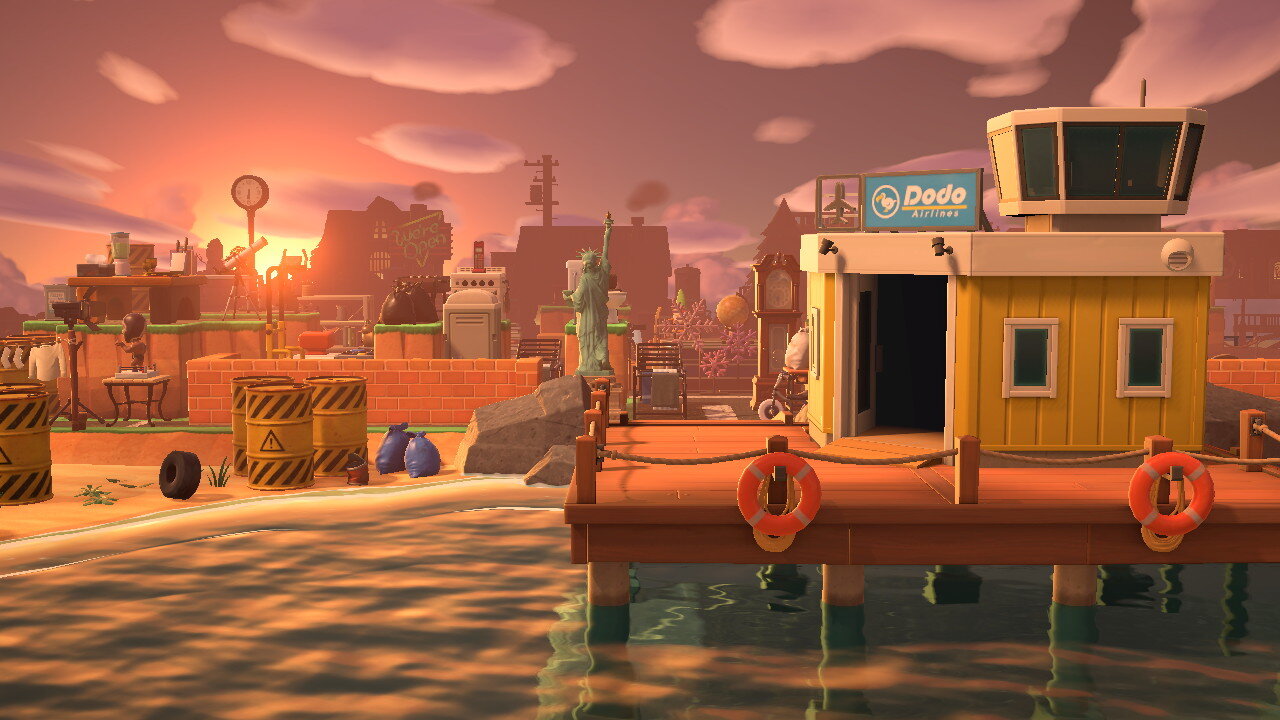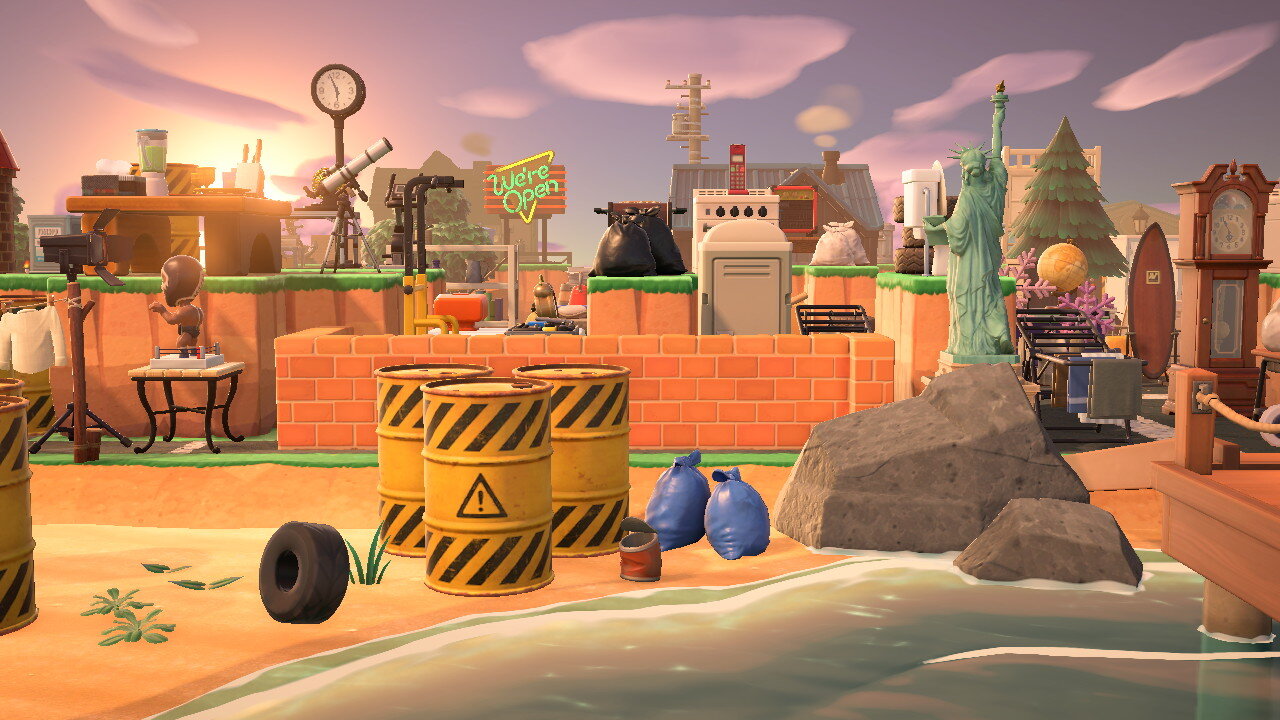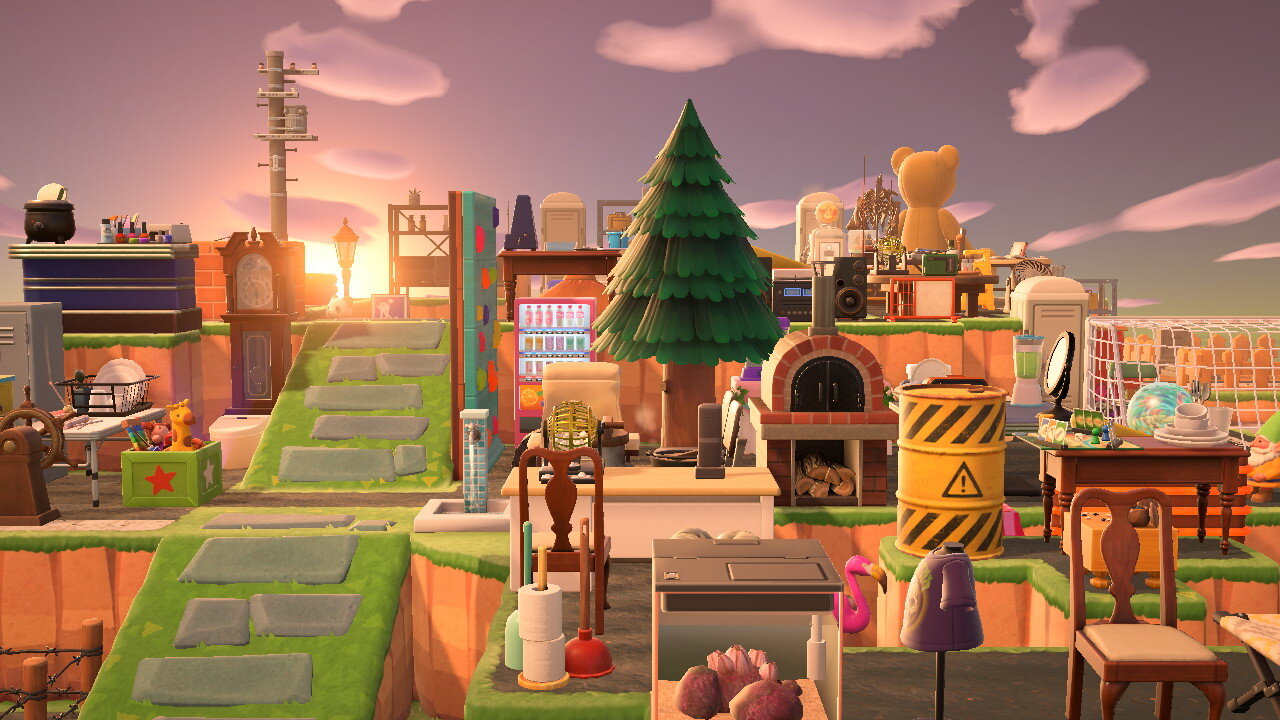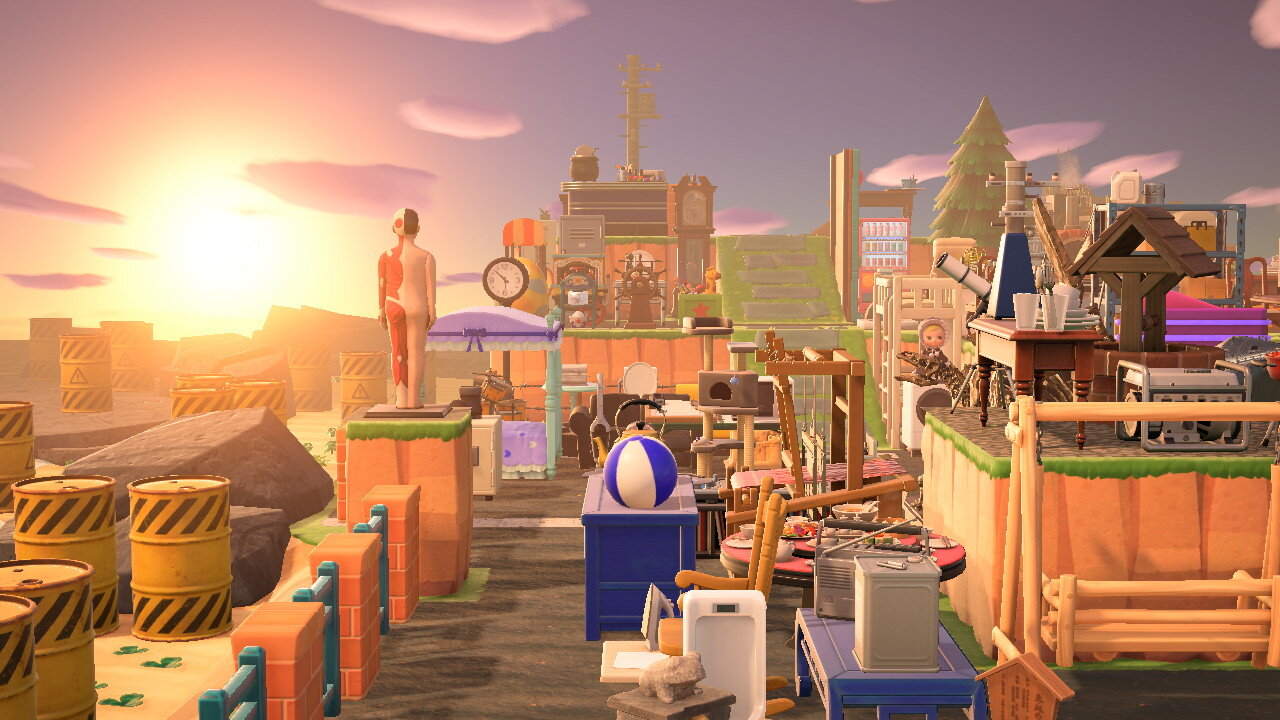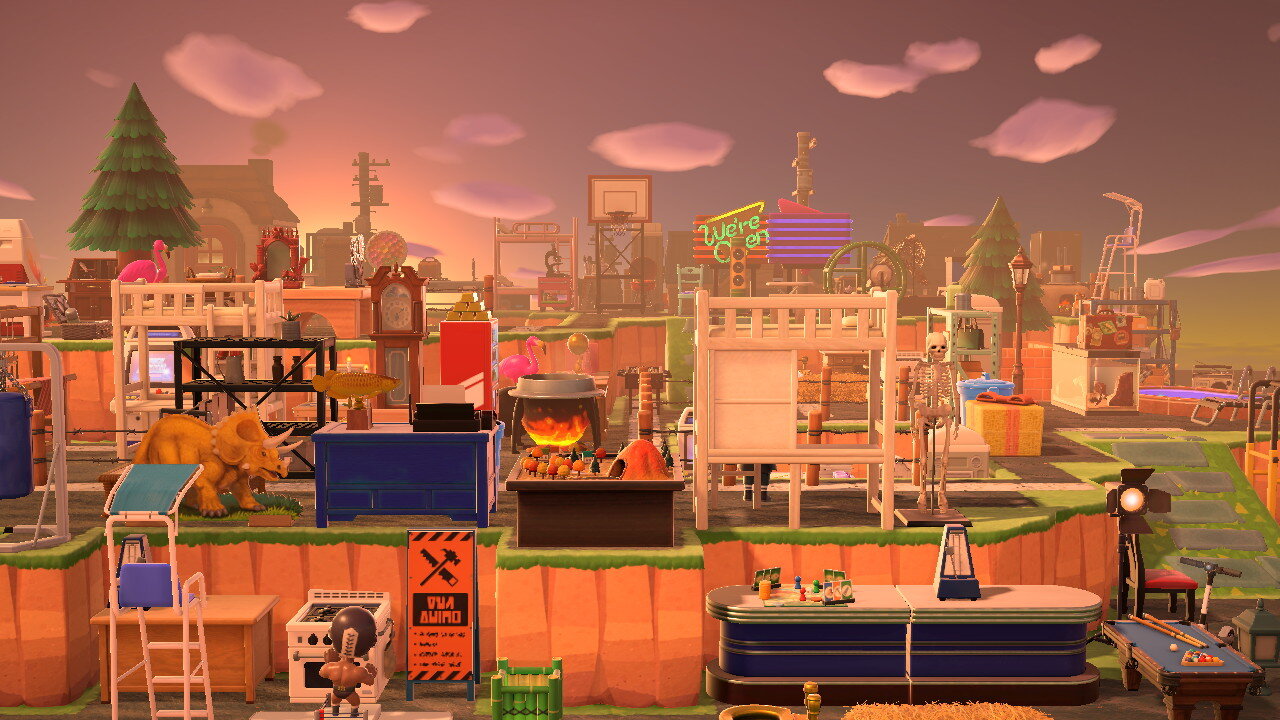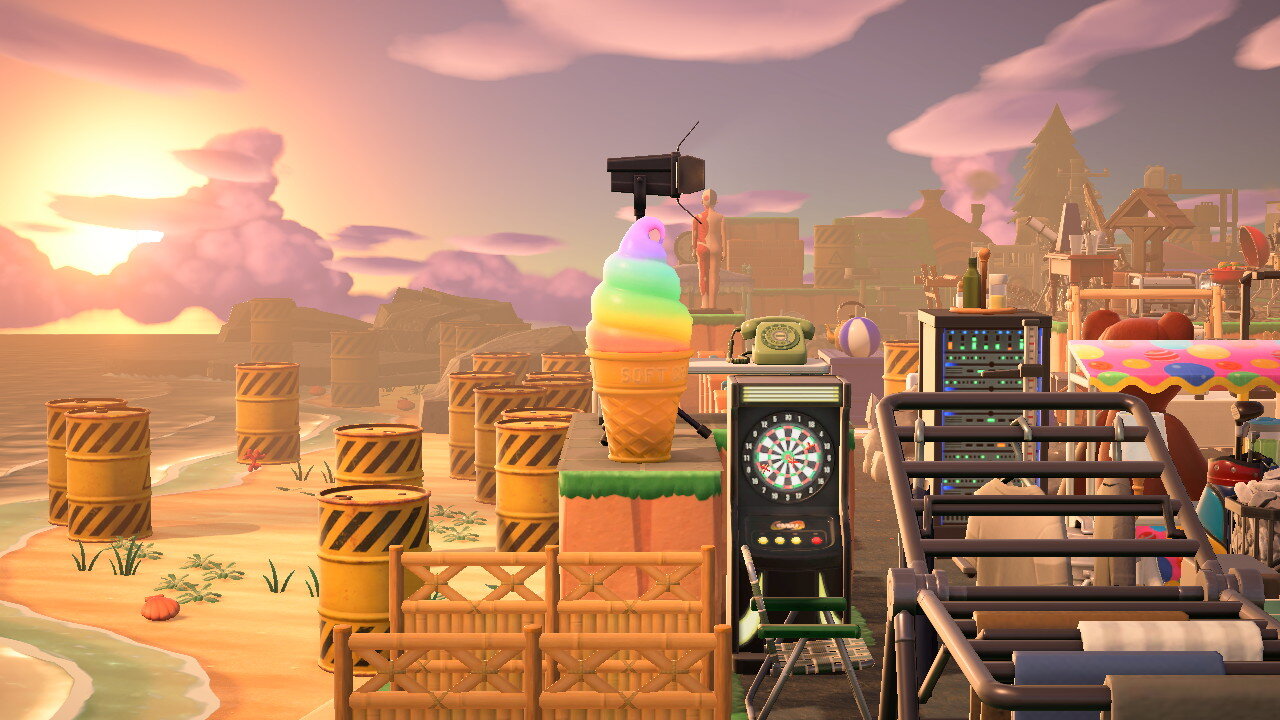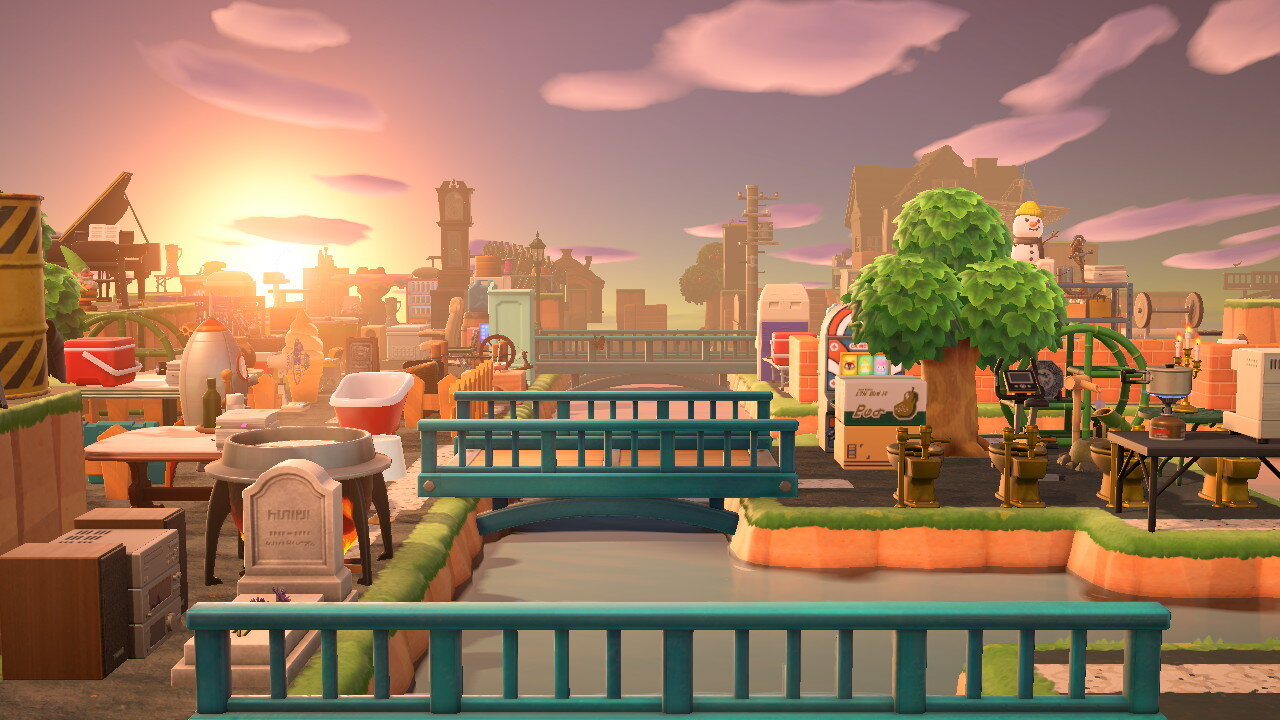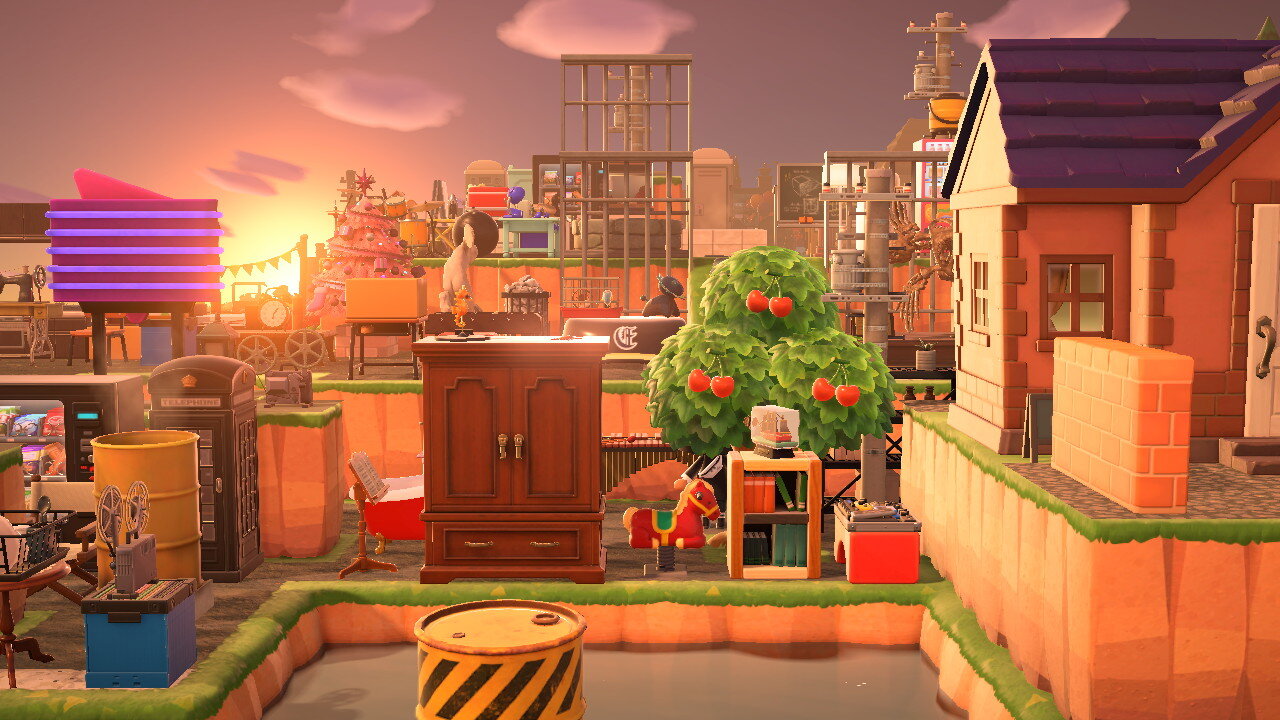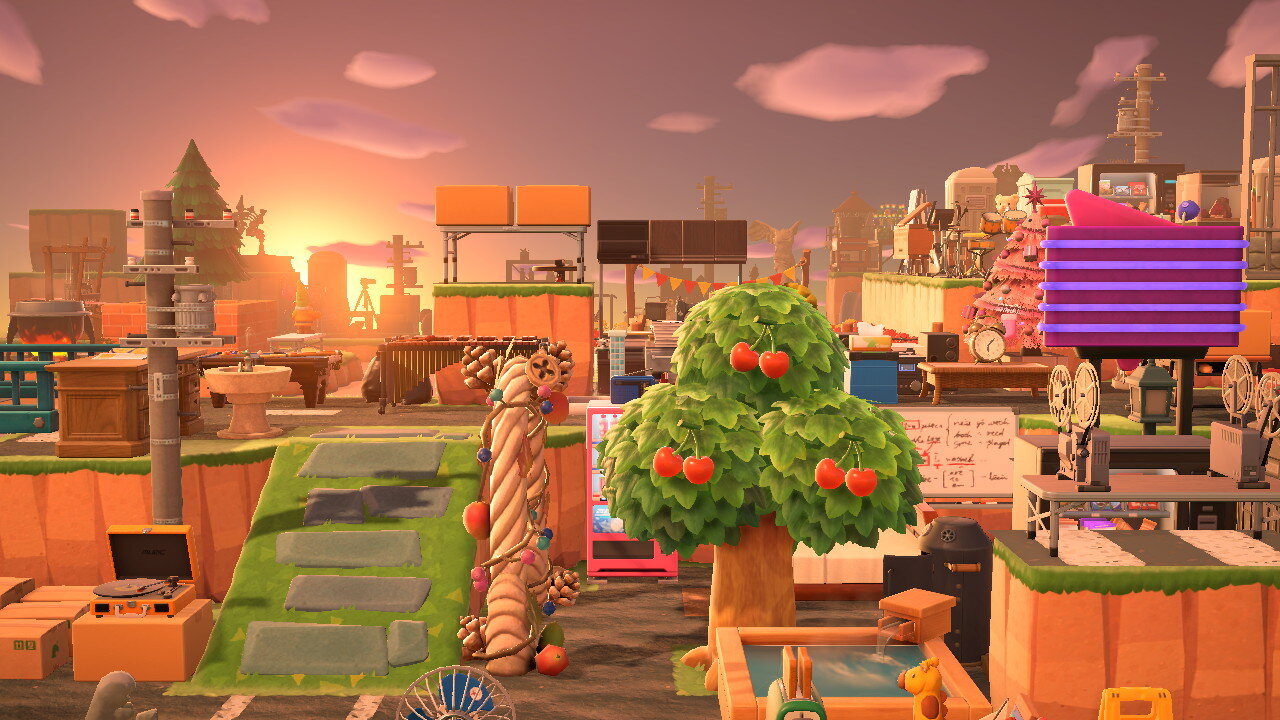Animal Crossing: All Mine
digital video (1980 x 1080), color, sound, 7’ 05”, 2020, United States
Created by Brent Watanabe
Conspicuous consumption is the implicit goal of innumerable video games, but Animal Crossing: New Horizons is, by far, the most shameless celebration of capitalism. Released in March 2020, the latest installment of the popular series became the most popular video game during the most intense months of the Covid-19 lockdown in Europe and the United States. A commercial triumph – more than twenty two million copies sold in four months – New Horizons gave players the possibility to escape from their brick-and-mortar homes and relocate to a minuscole island in the middle of the ocean. All they had to do was to purchase the innocent sounding “Deserted Island Getaway Package” from a development company called Nook Inc. Lured by the promise of playful evasion and endless growth, American artist Brent Watanabe soon found himself enslaved by perpetual debt, surrounded by a mountain of waste, and forced to compulsively perform bullshit jobs. An unofficial adaptation of Maurizio Lazzarato’s The Making of the Indebted Man, Animal Crossing: New Horizons is one of the most sophisticated simulation of neoliberalism ever concocted: suffice to say that players must take a mortgage on their virtual houses to start “playing”. Assuming the role of a modern day Robinson Crusoe with entrepreneurial skills, Watanabe spent more than one hundred fifty hours hoarding as many consumer goods as possible and displaying them on his island. He documented his performance with a machinima.
Combining a background in traditional materials and practices (drawing, sculpture) with emerging technologies (computer programming, electronics), Brent Wanatabe is exploring an artistic field still uncharted. For over a decade, he has been creating computer-controlled gallery installations populated by kinetic sculpture, drawing, projection, and sound. His 2016 project, San Andreas Deer Cam was streamed live on the internet, had over 800,000 visitors in the first three months, and was mentioned in several international publications, including New York Magazine, the BBC, and WIRED. Watanabe has participated in several group shows and screenings nationally and internationally, including Through Machine Eyes curated by James Bridle at the NeMe Arts Center, in Limassol, Cyprus, Game Changers at MassArt Art Museum, in Boston and Playmode at the MATT Museum, in Lisbon, Portugal. He has had recent solo exhibitions at SOIL Art Gallery (Seattle, 2006), McLeod Residency (Seattle, 2008), Jack Straw New Media Gallery (Seattle, 2009), Gallery 4Culture (Seattle, 2011), Anchor Art Space (Anacortes, Washington State, 2013), and Bumbershoot Music and Arts Festival (Seattle, 2016).
Matteo Bittanti: Back when The Sims was the defining cultural form of the Zeroes, Will Wright famously stated that this playful simulation was meant as a critique of capitalism, conspicuous consumption, and endless “growth”. Like Hoarders, the infamous reality TV show, The Sims illustrated the impossibility of coping with material accumulation. As the build-up continues at an accelerating pace, things start to fall apart until everything implodes, including the mental state of the characters. Beneath its kawaii aesthetics and cute characters, Animal Crossing, however, does not offer any critique of everyday life in a world shaped by Big Oil, Big Pharma, Procter and Gamble, Nestlé, Bayer, and Unilever. In fact, it openly celebrates such a lifestyle. What role does Nintendo’s game play in normalizing consumerism as the most (only) desirable goal in life?
Brent Watanabe: If you follow the storyline I suppose it does normalize consumerism as the highest goal in life. You take out a mortgage for God’s sake! And why would you need a larger house in that world but to store or display more belongings? I initially found the game appealing in the same way I was drawn to miniatures and charms as a child. Each of the objects you can craft, collect, or purchase in game reminded me of gumball machine trinkets, which I used to collect and display. But unlike the cheap plastic toys from my childhood, these digital trinkets are also interactive! Touch the vending machine and it drops chips! Touch the blender and listen to it whir! The game appealed to the collector in me. Can we be critical of and embrace consumerism simultaneously? Is there a healthy balance somewhere on the spectrum? I was definitely reacting to the over-the-top capitalistic bent that is the central storyline to the game, but I wonder if most people playing it are enamored by it for that reason? Are most players creating a capitalist dream house or a Zen garden? Albeit a zen garden populated with designer goods and things you’d find at a mall, all candy colors and logos and blinking lights and endless choices? I think the runaway success of Animal Crossing: New Horizons makes me think more about some of the basic human desires it satisfies through mindless repetition: People like goals, People like rewards, People like novelty, People like shiny new things.
Matteo Bittanti: Animal Crossing is a realistic simulation of privilege in so-called advanced societies: you wake up, complete rote tasks – what sociologist David Graeber would call “bullshit jobs” – consume as much as possible, constantly upgrade your stuff to keep up with the Joneses, discard perfectly functional items, and then repeat the entire process, over and over. The game pays little attention to labor and production and, above all, to the afterlife of objects. Waste is the main byproduct of capitalism, and yet the game does not address its environmental “collateral effects”: consider the toxic barrels that keep piling up on the beach next to plastic dolls, lamps, and stucco garden decoration. Why do you think that mainstream video games are such blatant vehicles for neoliberal propaganda (“there is no society, there are only individuals”, “every man is an island” mentality, consume as much as possible because “you are worth it”, ruthless competition as “natural”)?
Brent Watanabe: In Animal Crossing: New Horizons, nature is there as a resource for you to exploit for profit. The ocean is stocked with fish for you to display or resell. Insects exist in the same way. Even fellow villagers are there for higher island star ratings or trade. Break rocks and chop down trees to sell or make into products. There is no garbage or byproduct in this game, only more collectible stuff.
When I started this project, I was hoping to invite the general Animal Crossing: New Horizons community to my island to visit, drop off their unwanted garbage, and slowly cover my island with the byproduct of their gaming. The in game ‘dodo code’ system for visiting islands is so slow and tedious, however, that I quickly realized it would take me months, if not years, to cover my island in this manner, so I took to the task myself. Now that I have finished, I am considering whether or not to open my junkyard island to the community and let them pick at the carcass, bringing home whatever they’d like.
I don’t play many games, and even fewer mainstream games, so I can not speak to the propaganda point. I do know when I played Grand Theft Auto V – obviously a very mainstream game – I was enthralled by all of the STUFF I could interact with throughout the world. And I was really excited that I could destroy things... run cars into buildings, shoot objects and leave bullet holes. There is something about leaving your mark in a virtual world that feels empowering, even if it is trashing it or making things miserable. In fact, I think that is some of the appeal.
A lot of my work deals with consumption and waste because it is something I struggle with daily. I live in and actively participate in a capitalist society, with a job and a mortgage and online shopping. I enjoy the creature comforts and take out burgers and my electronic gadgets. But I know – and willingly forget at times – that my plastic bottles never break down, that the burger I ate was an animal that was likely raised on a factory farm, and that the garbage I put in the bin doesn’t magically disappear. I buy things packaged in plastic. I throw away my toothbrush when it gets old. And it all goes to a landfill or ends up floating in the ocean. Meaningful change is hard, and as a consumer I am leaving behind a tremendous amount of waste.
Matteo Bittanti: You spent more than one hundred and fifty hours covering your island with asphalt while gathering as many consumer goods as possible: you occupied every available space. In short, you “won”. Why do you think that so many people – millions, in fact – spend their time doing such mortifying, repetitive activities “for fun”? Based on your experience as an artist-anthropologist in virtual spaces, are the consumption rituals performed in Animal Crossing a supplement or a replacement of material consumption? Is amusement just an extension of work, as Theodor Adorno and Max Horkheimer famously stated in their essay on the Culture Industry in the 1940s? Is Animal Crossing merely aspirational, a vision of the “good life” promised by advertising as life is reduced to a process of home make-over and self-realization through a cornucopia of objects, that is, the normative practices of consumer capitalism? Is the activity of playing a video game a kind of psychopathology, then? Does the game actively construct a kind of subjectivity that elevates corporate life uber alles? Is achieving and displaying economic capital the ultimate goal?
Brent Watanabe: Animal Crossing: New Horizons’s draw is as much the draw of a gambling machine as it is a consumption system. I was initially irritated when the game forced me to collect branches and pull weeds to progress. It was almost insulting. But I wanted to see more. I wanted to see what happened next. I wanted to see more STUFF. I wanted to progress. And Animal Crossing: New Horizons does a great job of incentivizing everything. I wanted each day to pass faster so I could see what new items were in Nook’s Cranny, to see if there was buried treasure for me to dig up, to have money appear in the ATM for the goods I sold the previous day. The social aspect of the game definitely plays into the idea of “keeping up with the Joneses”.There are people at my day job who play regularly, and they talk about being embarrassed of their island, because it doesn’t measure up. They don’t want others to visit, because it isn’t nice enough. YouTube features island walk thru videos with millions of views, the equivalent of MTV Cribs and Lifestyles of the Rich and Famous. And man, are they appealing! I watch them and marvel at the design, the ingenuity, the stuff, and then mentally flog myself for enjoying it.
Matteo Bittanti: Over at The Atlantic, Ian Bogost wrote that “all video games aestheticize busywork. But few make it feel like freedom”. Do you agree with this diagnosis? Do you feel free while playing Animal Crossing? Isn’t it ironic that games that promise “endless possibilities”, “open worlds” and “freedom of movement” end up replicating the most inane features of the so-called real world?
Brent Watanabe: Was that quote in reference to his Cow Clicker project? It feels like gated freedom. It feels like I’m the subject of an experiment, where I can choose anything I want to do within the confines of this highly structured system. And that is a fascinating and comforting world to exist in. Everything there exists only for you, and has been placed there for a reason. I remember playing Grand Theft Auto V and how I wanted to explore everything I encountered, to go into every convenience store and marvel at which of the items I could interact with and which doors worked. The NPCs were endlessly fascinating, how they reacted to my presence and various actions. I definitely don’t move through the real world like this. Imagine the fascination one could have going into the grocery store and inspecting the unique qualities of each package, watching the unique behavior of each individual shopper, and with the understanding that it is all here for me, because of me.
Matteo Bittanti: In your outstanding artwork San Andreas Deer Cam, an artificial intelligence acts like a human being, roaming in the streets of a virtual metropolis in the guise of a quadrupede. Animal Crossing: All Mine is a penetrating commentary on people’s robotic and mimetic behaviour, centered on mindless repetition, fitness workouts on YouTube and pavlovian online shopping. Is the convergence between the human and the machinic just a means for capitalism to assert its influence over all spheres of life? Is Animal Crossing an allegory of our crisis resulting from corrupt patterns of consumption and individual psychic aberrations?
Brent Watanabe: Animal Crossing: New Horizons is a lot like a slot machine: the system draws you in with the promise of a payoff, as long as you agree to continue to push the button or pull the handle. It is entertainment to a certain degree, but at some point it can cross over into compulsion, especially if you consider what you’re doing: you are completing mundane repetitive tasks to earn trophies to display. My project just takes the general mission of Animal Crossing: New Horizons to the extreme. If you like stuff, you’re going to love lots of STUFF! But mine is a dead island, an estate sale after the hoarder dies, their life defined by everything they collected, valued, and left behind.
Matteo Bittanti: The stress, uncertainty, and isolation caused by a global pandemic transformed Animal Crossing from a mere video game into a “safe space”, a kind of virtual refuge for mediated pseudo-intimacy and simulated companionship via cute anthropomorphic animals. And yet – as your project seems to demonstrate – replicating the world’s neoliberal imperatives, such as accumulation, conspicuous consumption, and self-affirmation through material wealth was many players’ priority. Was Fredric Jameson correct when it famously stated that it’s easier to imagine the end of the world than to imagine the end of capitalism? Is Animal Crossing the ultimate neoliberal fantasy at the end of (a) history? If corporate entertainment is a totalizing reality, is art the only dissenting voice?
Brent Watanabe: Why are people drawn to Animal Crossing: New Horizons? Is it an aspirational dream-doll house, where you can afford all of the material things you’ve dreamed of, including a multi-level home with a mortgage? Is it the social aspect of the game, which allows you to create a comfortable personalized space where you can then host friends? Is it the task based, cause and effect, slow paced regularity of the game that soothes in the same manner as popping bubble wrap? I found the world relaxing, although my carpal tunnel flared up from the repetitive use of the Joy Cons. I’m a dissenting voice, but a hypocritical dissenting voice that enjoyed his time in the game. I struggle between my wants, and my catholic guilt associated with these wants.
Matteo Bittanti: A cemetery littered with vending machines, neon signs, trashcans, fans, pianos, tires, toilets, road signs, appliances, Christmas trees… A colossal dump. As I watched Animal Crossing: All Mine, I was reminded of Rem Koolhaas's notion of junkspace: “If space-junk is the human debris that litters the universe, junk-space is the residue mankind leaves on the planet. The byproduct of modernization is not modern architecture but Junkspace. Junkspace is what remains after modernization has run its course or, more precisely, what coagulates while modernization is in progress, its fallout. Modernization had a rational program: to share the blessings of science, universally. Junkspace is its apotheosis, or meltdown... Although its individual parts are the outcome of brilliant inventions, lucidly planned by human intelligence, boosted by infinite computation, their sum spells the end of Enlightenment, its resurrection as farce, a low-grade purgatory…” The New Horizons mentioned in the title are thus virtual junkspace?
Brent Watanabe: I wasn’t aware of Koolhaas’s concept of junkspace, and it brilliantly sums up much of what I was thinking about when working on this piece. Thank you for sharing it. I remember reading an article about how too much of anything can generate repulsion. Hoarders collecting newspapers, an infestation of cats, even this overlaid speedrun of Super Mario, they all inspire a sort of skin crawling effect, even as the individual objects are neutral or even beloved.
Matteo Bittanti: During the most intense phase of the lockdown, several game streamers who normally enjoy quick, adrenaline-intense action games switched to the soothing atmosphere of Animal Crossing and began streaming their gameplay sessions for hours. In a sense, Animal Crossing became the video game equivalent of Painting with Bob Ross: the sheer banality of the visualscape coupled with a soporific soundtrack did produce relaxing effects. Your room might be a complete mess and Fox News would be spewing hate and disinformation 24/7, but you will feel fulfilled by doing household chores for hours on end, onscreen. In Enjoying It: Candy Crush and Capitalism, Alfie Bown argues that the most insidious side effect of video games is that they distract us from the inner contradictions of everyday life under capitalism. Video games are meant to simulate some kind of productivity as to confirm the “sanctity” of the marketplace and the inexorability of the current system, which incidentally is the basic imperative of gamification, as the most outspoken evangelist, Jane McGonigal, told the TED crowd more than a decade ago. In other words, people play Animal Crossing during the lockdown to remember what capitalism looks and feels like, so that when restrictions are eased you can go back to the so-called “normality” and perform as a productive member of society once again. In George A. Romero’s Dawn of the Dead (1978), the living dead walk around the mall because the idea of shopping is ingrained, almost imprinted, in their brains, no matter how putrefied and rotten after the contagion. Alright, I guess my question is: are players of Animal Crossing basically zombies?
Brent Watanabe: It is impossible to look at Animal Crossing: New Horizons without acknowledging the capitalist nature of it. The game revolves around a central theme: you complete tasks to earn currency to purchase more to improve your living space and desirability. During the pandemic, the game also functions as a fidget spinner, and is something to nervously fiddle with. It occupies your mind with something other than the uncertainty and worry that continues to envelop much of the world. I had a lot of difficulty focusing on anything during the first month of COVID lockdown in Seattle, and Animal Crossing: New Horizons was something I could return to and take refuge in its simple rules. I was rewarded for my diligence with tiny victories: a new tool, a steel bridge, a pinball machine. It gave me a sense of structure, of simple cause and effect, which was missing in the external world.
I play a handful of games for this zombie-like escape. Just today I played The Long Dark, a beautiful survival game set in a snowy wasteland. I find it to be a quiet, focused environment to escape into when the outside world overwhelms me with wildfires, pandemic death, civil unrest, and the daily stressors associated with work and home and aging and family.
I like the phrase ‘the inner contradictions of everyday life under capitalism’. I definitely wrestle with them daily, and most of my art focuses on these contradictions, although my sentence might read ‘the inner contradictions of everyday life, convenience, and my wake of destruction and indirect suffering’.
Matteo Bittanti: Modding console games is not easy, especially if compared to the PC. What kind of interventions did you perform to customize your experience with Animal Crossing?
Brent Watanabe: I didn’t mod until after I’d pretty much completed my island. There is a mod that alters the camera, flattening the world,and giving you a fish eye view, and I knew it would be perfect for documenting my island. I went down the rabbit hole, though I was worried about bricking my Switch, but it turned out to be relatively easy as long as you carefully follow the steps you find in this Guide to Hacking Your Nintendo Switch. The only modding I did was digging around the image system, removing the Animal Crossing splash image, and then recording the intro scenes, where the camera follows residents of your island. I was going to alter the splash screen to include my “All Mine” but didn’t like the way it turned out.
Matteo Bittanti: Is there anything else you’d like to add?
Brent Watanabe: About fifty hours into the project, I paid to visit a black market island, and I requested that the owner create rows and rows of garbage, such as tin cans and tires, for me to bring back to my island. I needed more garbage to sprinkle among the shiny new products I was collecting, and it’s surprisingly difficult to find garbage in the game. The Animal Crossing: New Horizons black market could be the subject of a whole separate project. It was a bizarre experience, and felt quite illicit (as illicit as you can get in Animal Crossing: New Horizons, anyway). I purchased a visit to an island from a real human being on eBay, scheduled a rendezvous, received a dodo code to allow access, and then flew to their island. They (their avatar) met me at the gate, then silently walked me around the island, running loops around places of interest.
A note about my project: I’m not only critiquing the game, or capitalism, or players of Animal Crossing: New Horizons, I am also critiquing myself. The piece is me struggling with my relationship to consumerism. My choices in life, the products I buy, the stuff I throw away, and the questions I regularly choose not to engage with, like where my discarded food container goes or what the life was like for the animal that was the meat in my chicken burrito. I am aware the answers are out there, and they are dire, but I fearfully choose not to engage. Fear of what? Fear that I should sacrifice convenience to live with my conscience?
Animal Crossing: All Mine
digital video (1980 x 1080), color, sound, 7’ 05”, 2020, United States
Created by Brent Watanabe, 2020
Courtesy of Brent Watanabe, 2020
Made with Animal Crossing: New Horizons (Nintendo, 2020)



